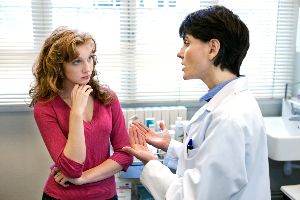Which STDs Are Most Common in Women?

Part of good gynecological care entails being informed about common sexually transmitted diseases (STDs). While all sexually active women are at risk of certain STDs, there are methods you can use to reduce your risk and ensure good health. This guide explains what to look for if you have concerns about symptoms.
4 Common STDs and How They Can Be Prevented
1. Chlamydia
Chlamydia results from a bacterial infection that can be passed along via sexual contact. This infection can be asymptomatic, or it can cause discomfort in the abdomen, pain during sex, abnormal vaginal discharge, and painful urination. While chlamydia is easy to treat with antibiotic medication, it can cause major health issues if left untreated. It can be prevented by practicing safe sex, such as using condoms, and discussing past sexual histories with new partners.
2. Genital Herpes
Genital herpes results from herpes simplex viruses 1 and 2, which can be passed along via skin to skin contact. It can take from 2 to 12 days for symptoms to appear, which includes blisters in and around the genitals. Blisters are also preceded by itching and redness in the affected area. Barrier methods of contraception can reduce your risk of acquiring genital herpes. Additionally, you should never engage in sexual contact with a person displaying symptoms.

3. Human Papillomavirus (HPV)
HPV is a viral infection that is exceedingly common in terms of STDs. In many cases, HPV does not cause any symptoms, although it can still be transmitted to partners via sexual contact. Some forms of it cause genital warts to form in different areas, including on the vulva and within the vagina. Other forms are associated with an increased risk of cervical cancer, which is why prevention is so crucial. In addition to using condoms during sexual intercourse, women are also encouraged to get the HPV vaccine, which is effective up to 45 years of age.
4. Gonorrhea
Like chlamydia, gonorrhea is also caused by bacteria. It's most often transmitted through vaginal, anal, and oral sex. Women may not develop symptoms, and if they do, symptoms typically mimic yeast infection. This includes abnormal vaginal discharge, pain during sex, painful urination, and an itching sensation in the genitals. Antibiotic medication can cure gonorrhea, but your chance of catching it can be lowered by practicing safe sex with every partner.
When you have questions about your sexual health in Rochester, NY, you can turn to the gynecological care staff at Genesee Valley Obstetrics & Gynecology PC for answers. In addition to their extensive skill and experience, this team of doctors and specialists also treat patients with the kindness and compassion they deserve. Schedule a gynecological care appointment today by calling (585) 232-3210. You can also learn more about their services by visiting the website.
About the Business
(4 reviews)
Have a question? Ask the experts!
Send your question

